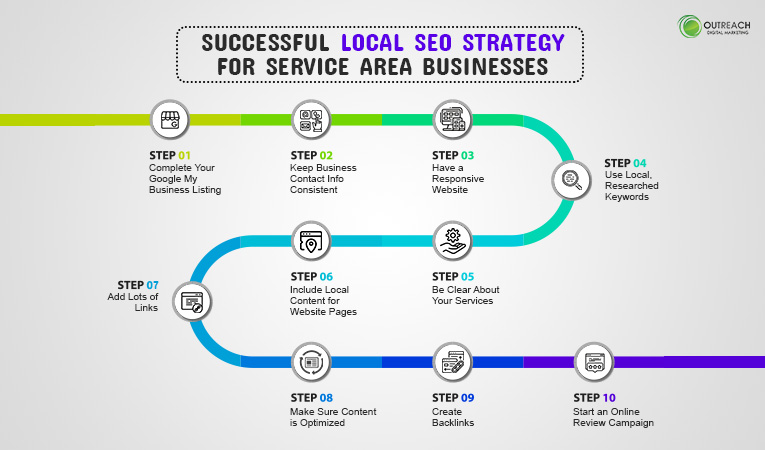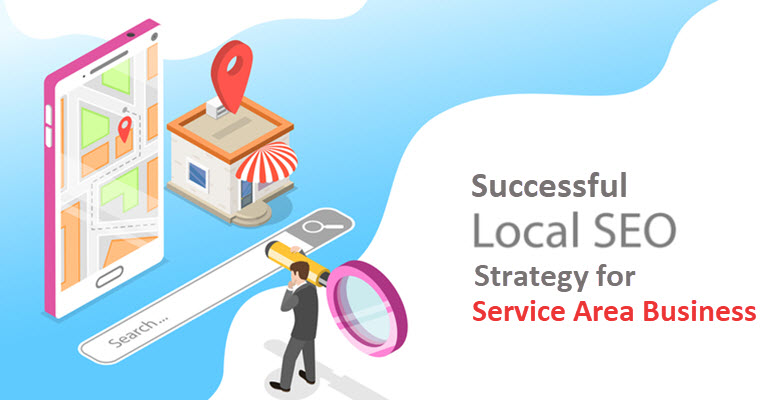As a service area business, you depend on local customers. As a result, you need to reach your ideal customers at the point they are seeking your service. Today, that means leveraging local SEO strategy to be the first company your prospects see when searching for your specific offering. Here we look at successful local SEO strategies to grow your service area business.

Complete Your Google My Business Listing
Think of GMB as the base of your local SEO efforts. This free tool offers everything you need to set a firm foundation using your business profile. This is the tool Google uses for local search results to literally put you on the map — Google Maps that is. However, in order to leverage this free marketing opportunity, you need to complete your entire GMB profile. You can improve your local organic ranking and become part of the local “pack” so more customers know you exist. All you have to do is fill in all possible information in your profile and keep that information consistent, especially your company name, phone number, website and address.
Keep Business Contact Info Consistent
Wherever your business name, address, phone number and website link appear online is called a citation. Google uses citations to help establish you as a local, legitimate business. However, if you are inconsistent in how you list your contact information this actually interferes with your ranking. Make sure you take advantage of:
- Local Business Listings
- Local Citations
- Industry Listings
Check out how your company is listed to make sure all your info aligns exactly with your GMB information.
Have a Responsive Website
Responsive websites allow visitors to view your website from any device seamlessly. Mobile-friendly designs are now a major indicator for Google when placing you in their ranking. Fast, responsive websites reign supreme as these websites provide a better user experience. A digital marketing company can create a responsive website design that adapts to devices, so your content is easy to view.
Let’s have a look at these stats data from Rebrandly on importance of having a responsive website.
- People tend to access the internet from more than one device.
- There’s more mobile internet traffic than desktop/PC traffic.
- People will like your website better if it offers a good mobile experience.
- People won’t recommend you to their friends if your website’s mobile UX is poor.
- Not having a mobile-friendly website helps your competitors.
- A poor mobile experience can hurt your company’s reputation
- A mobile-optimized website increases consumer trust and positive feedback.
Use Local, Researched Keywords
Local keyword research allows you to find the service area business keywords relevant to your area and industry. With the right keywords, your SEO content strategy becomes more targeted, and you’ll understand the phrases locals use to find you. Google’s free tools make it easy to research local service keywords and even get ideas for content.
You’ll know what questions people want to be answered and can update your website to improve your rankings. Of course, this is easier said than done because keyword research requires know-how. Understanding what keywords will help improve your rankings without too much competition can be tricky. An SEO company that understands the needs of a local small business can help develop an effective local SEO keyword strategy.
Be Clear About Your Services
Generic information that is vague and uninformative is never a good thing for local SEO. Your website needs dedicated service pages that provide clear information with a summary of each individual service you offer. You can always list your services on your Home or even About pages, but to optimize your local search you need to use those local service keywords effectively. Individual service pages are better for visitors as they provide answers.
With a page per service, information is condensed into the specifics so visitors aren’t searching through a long page of information trying to figure out if you can help them. You can also then have more opportunities to add links from your Home and About pages to the specific services listed, and between service pages. This structure is preferred by search engines because it allows them to get a better understanding of what you offer. It also allows you to build your link profile for higher rankings. More about that later.
Include Local Content for Website Pages
Having a generic website that only mentions your location on the contact page just isn’t good enough to compete in local searches. You need to drill down on your website pages creating local-specific content for your services. Dedicated local pages are required for every service area, not just your city or town. Wherever you offer your services, you need a page to see results for local SEO.

This is a major undertaking that requires not just dedicated service pages for each location, but in the best-case scenario original content for each of those pages. So instead of simply creating a generic service page and then inserting different locations to create local content, ideally you want original content for each location and service. A basic template for a local content page would include:
- Information about your company serving the area such as “Our roofing company in Small Town has been providing trusted roofing services for over 10 years.”
- A blurb about the area tied nicely into your service such as “Small Town is known for its heavy snows where roofs are at risk for leaks.”
- Information about your services with mention of the area such as “As a homeowner in Small Town, annual roof inspections are a must.”
- Images of related services provided in that specific area
- Testimonials from customers in that specific area
Your business address should also appear on every page.
Add Lots of Links
Once your content is complete, add lots of links to make it easier for people to navigate your site. This is very important because Google uses links to crawl your site and get a better feel for what you’re about. Internal links can be used to:
- Leverage local rankings linking between your location pages to provide context so Google knows when your pages should rank
- Improve navigation so people can click links to find more information from service to service, blog to blog, etc.
- Use anchor text that tells Google and readers where the link leads as opposed to a generic “click here” link
The better you become at adding internal links, the better your SEO becomes.
Make Sure Content is Optimized
You now have a base of excellent content you can optimize even further with attention to details including:
- Title Tags: This is what Google lists in the search results. The title should use the keyword and location relevant to your content.
- Page URLs: Each URL should use the relevant keywords.
- Meta description: This is the blurb in your listing that tells people about the page. If you don’t write a meta description, Google decides what to show, which isn’t always ideal.
- Use Keywords: Include keywords in your content, but make sure they appear naturally, not forced. Keywords should ideally also appear in your subheadings.
- Image Alt Tags: Always include relevant images to your content, with an image alt tag that describes the image to boost keywords.
- Include Subheadings: Subheadings make it easier for people to skim your content while also breaking it up into readable bites.
- Include Quick Contact Info: Every page should have a link or contact info at the top and bottom so people can contact you right away.
- Links: As mentioned you should add links throughout your pages so people easily find more information as they read.
Also, make sure you include calls-to-action so people can easily click to either find further information, request a quote, get access to a special offer, download information, email you, etc.
Create Backlinks
Backlinks, or external links help raise visibility. When other sites of authority link to your content, it is one of the best ways to reach the top ranking. Some easier ways to create backlinks include:
- Listings on local directory sites
- Offering to write a guest post for relevant sites of authority
- Press releases to online, local news publications
- Local event sponsorships
- Local business partnerships
- Creating your own local resource page for shares and links
You can also offer to exchange links with other local businesses.
Here are some of the helpful stats data on backlinks by Impact.
- 91% of all pages never get any organic traffic from Google, mostly due to the fact they don’t have backlinks.
- The more backlinks a page has, the more search traffic it gets from Google.
- Top results on Google’s first SERP have 3.8 times more backlinks than those below them.
Start an Online Review Campaign
Getting online reviews helps build trust. Not everyone writes reviews, and often it is the unhappy people that head to the keyboard to share their disappointment. However, you can start an online review campaign to get your happy customers writing reviews. Once your services are complete, your automated email campaign asks customers to complete a review, with a convenient link to make it easy. Other ideas to get more reviews include:

- Surveys that include a link to a review page
- Using social media to ask for reviews
- Offering an incentive for reviews
- Having a testimonial page or review link on your website
You should also keep an eye on your online reviews. Reputation management ensures you respond promptly to complaints to show customers you care. However, that’s a completely different blog!
It takes time to get your SEO working for you. Using these tips will help improve your organic local rankings, while also providing the best possible content for people who do wander onto your site. A strong local SEO strategy can be difficult to create on your own, so speaking to a digital marketing company can help. If you have questions about local SEO, please reach out to our team today!
